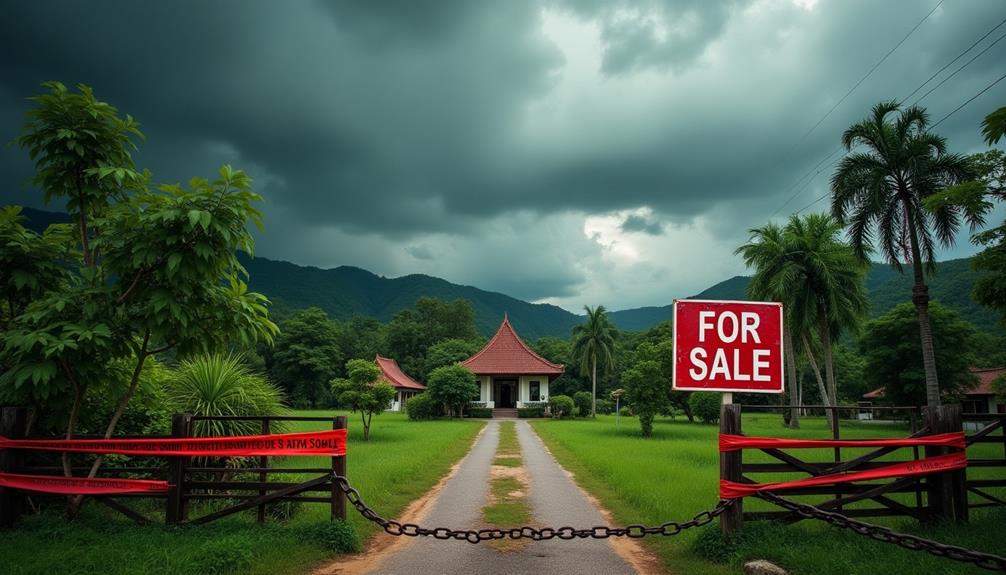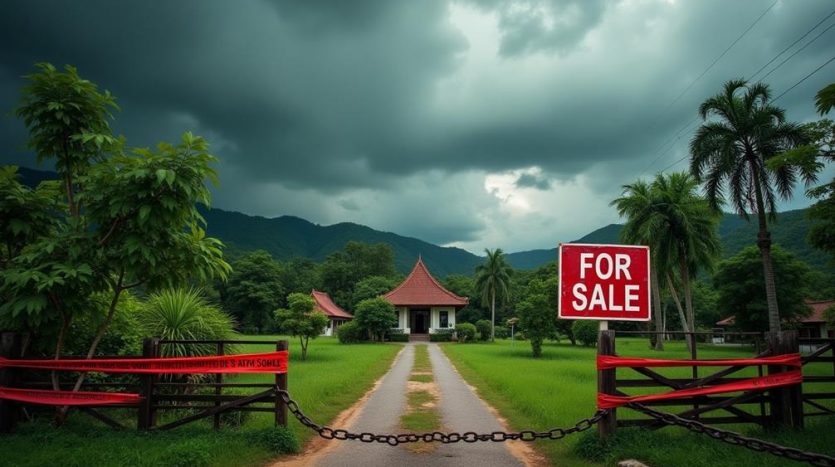Is Buying Property in Thailand a Good Investment?
Considering buying property in Thailand? You'll find the market offers promising returns, with rental yields between 5% and 8% and high demand for both urban and vacation homes. However, maneuvering legal restrictions on foreign ownership and potential currency fluctuations can be tricky. The potential for property appreciation and favorable tax benefits add to the appeal, but you'll need to consult local experts to guarantee compliance with all legal requirements. Ready to explore whether this investment aligns with your financial goals? Let's look into it further.
Key Takeaways
- High rental yields of 5% to 8% in key cities like Bangkok and Phuket.
- Consistent property value appreciation, with Bangkok averaging 4% annually.
- Attractive tax benefits due to lower property taxes compared to Western countries.
- Strong demand for rental properties in tourist hotspots ensures high occupancy rates.
- Legal complexities and foreign ownership restrictions require professional legal assistance.
Legal Considerations

When buying property in Thailand, understanding the legal considerations is essential. You'll find that property ownership for foreign buyers is a bit like a dance with multiple steps.
First, foreign buyers can't directly own land, but you can own buildings and structures. So, if you're eyeing that beachfront villa, you'll own the house, but not the sand it sits on. To navigate these complexities effectively, consulting a local lawyer is strongly recommended, guaranteeing compliance with legal intricacies and regulations.
Condos are a different story. Foreigners can own up to 49% of a condominium's total area, making it a popular choice. You'll need to verify that the condo project meets this quota before you sign on the dotted line. Data shows that this 49% rule is strictly enforced, so don't get any wild ideas.
Another critical point: funding. Foreign buyers must bring money from abroad to purchase property. The funds must be transferred in foreign currency and converted to Thai Baht upon arrival. You'll need a Foreign Exchange Transaction Form (FETF) from the bank to prove this.
Lastly, Thai law allows for 30-year leaseholds with the option to renew. While not as cozy as outright ownership, it's a viable workaround.
Market Trends
Maneuvering the legal landscape is just the beginning; understanding current market trends is equally critical for making informed decisions. In Thailand's property market, conducting a market analysis helps you navigate the ever-evolving terrain.
Over the past few years, there's been a noticeable shift towards urban properties, especially in Bangkok. Condos are the darlings of the market, thanks to their high demand among expats and younger locals. You'll find that high-rise buildings sprout faster than mushrooms after rain.
However, don't let the glitz fool you; suburban and provincial areas are seeing their own renaissance. Chiang Mai and Phuket are hotbeds for villas and townhouses, providing a laid-back yet lucrative alternative. The key is to understand which property types resonate with your investment goals.
Koh Samui, known for its affordable living and vibrant expat community, is also becoming an attractive destination for property investments due to its mix of luxury villas and budget apartments.
Data suggests that the rental yields in major cities hover around 5-8%, while coastal areas offer a mix of stable and seasonal returns. Market trends also show a growing preference for eco-friendly and smart homes, aiming to attract the tech-savvy and environmentally conscious crowd.
Investment Potential

Investment potential in Thailand's property market hinges on several key factors that can greatly influence your returns. First off, let's talk about rental income. Cities like Bangkok and Phuket are hotspots for expats and tourists, making them prime locations for rental properties. You can expect rental yields ranging between 5% to 8% per year. That's not bad, especially when you consider the low cost of living and relatively low property prices.
Now, turning to property appreciation, Thailand has witnessed a steady increase in real estate values over the past decade. The table below summarizes key data points:
| City | Average Rental Yield | Annual Property Appreciation |
|---|---|---|
| Bangkok | 6.5% | 4% |
| Phuket | 7% | 3.5% |
| Chiang Mai | 5.5% | 2.8% |
These numbers suggest that your investment could grow both through rental income and property appreciation. But don't get too giddy just yet; market fluctuations and economic policies can throw a wrench in the works. So, always keep an eye on trends and consult local experts. After all, who doesn't want their cake and to eat it too?
Benefits of Buying
Buying property in Thailand offers several compelling benefits that can enhance your financial portfolio.
First, let's talk numbers. Thailand's property market has shown consistent growth, meaning your investment can appreciate over time. You'll also enjoy attractive tax benefits. The country's tax system is investor-friendly, allowing you to keep more of your returns. For instance, property taxes are relatively low compared to Western countries, which means less of your hard-earned money goes to the government and more stays in your pocket.
Now, let's talk rental income. Thailand is a hotspot for tourists and expatriates, making it an ideal location for generating rental income.
Imagine your property being a cash cow, producing steady rental returns. With high demand in popular areas like Bangkok, Phuket, and Pattaya, you can achieve impressive occupancy rates and rental yields.
Plus, you can even use your property as a vacation home when it's not rented out. Talk about a win-win!
Risks and Challenges

Risks and Challenges
While the benefits of buying property in Thailand are enticing, it's imperative to understand the risks and challenges that come with it. Currency fluctuations can greatly impact your investment. The Thai baht might strengthen or weaken against your home currency, affecting the value of your property and rental income. If you're not a fan of financial roller coasters, this might feel like riding a tuk-tuk with no brakes downhill.
Additionally, understanding property rights and legal requirements is crucial to avoid legal issues.
Property management is another important consideration. Unless you're moving to Thailand, you'll need to hire a local property manager. Finding a reliable one can be tricky; the wrong choice could lead to maintenance issues, tenant complaints, or even legal problems. Just imagine trying to sort out a plumbing disaster from halfway across the world. Fun, right?
Lastly, legal complexities can't be ignored. Foreigners face restrictions when buying land, often resorting to long-term leases or forming Thai companies. Both options come with their own set of bureaucratic hoops to jump through.
You'll need a good lawyer to navigate this maze, adding to your costs and stress levels.







